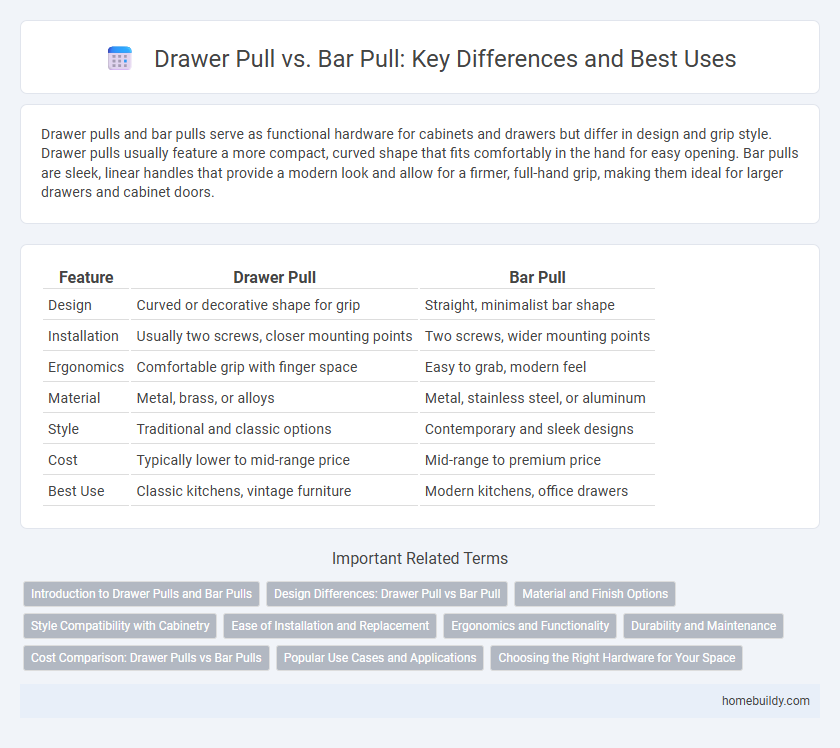Drawer pulls and bar pulls serve as functional hardware for cabinets and drawers but differ in design and grip style. Drawer pulls usually feature a more compact, curved shape that fits comfortably in the hand for easy opening. Bar pulls are sleek, linear handles that provide a modern look and allow for a firmer, full-hand grip, making them ideal for larger drawers and cabinet doors.
Table of Comparison
| Feature | Drawer Pull | Bar Pull |
|---|---|---|
| Design | Curved or decorative shape for grip | Straight, minimalist bar shape |
| Installation | Usually two screws, closer mounting points | Two screws, wider mounting points |
| Ergonomics | Comfortable grip with finger space | Easy to grab, modern feel |
| Material | Metal, brass, or alloys | Metal, stainless steel, or aluminum |
| Style | Traditional and classic options | Contemporary and sleek designs |
| Cost | Typically lower to mid-range price | Mid-range to premium price |
| Best Use | Classic kitchens, vintage furniture | Modern kitchens, office drawers |
Introduction to Drawer Pulls and Bar Pulls
Drawer pulls are hardware fixtures designed for easy gripping and opening of drawers, commonly available in various shapes such as cup, drop, and edge pulls. Bar pulls feature a sleek, linear design, often extending the width of the drawer front, offering a modern look and ergonomic grip. Selecting between drawer pulls and bar pulls depends on aesthetic preferences, functionality, and compatibility with the furniture style.
Design Differences: Drawer Pull vs Bar Pull
Drawer pulls typically feature a curved or ornate design that offers a more traditional aesthetic, while bar pulls present a sleek, modern look with straight, linear lines. The ergonomic grip of drawer pulls often provides more surface area for fingers, enhancing comfort during use compared to the minimalist form of bar pulls. Materials for drawer pulls frequently include metals with decorative finishes, whereas bar pulls tend to emphasize stainless steel or matte black for contemporary settings.
Material and Finish Options
Drawer pulls and bar pulls differ significantly in material and finish options, impacting both aesthetics and durability. Drawer pulls commonly come in materials like brass, zinc alloy, and stainless steel, offering finishes such as antique bronze, brushed nickel, and polished chrome that cater to traditional and vintage styles. Bar pulls typically feature aluminum or stainless steel with sleek finishes like matte black, satin nickel, or chrome, suiting modern and minimalist designs while providing corrosion resistance and ease of maintenance.
Style Compatibility with Cabinetry
Drawer pulls offer a more traditional and ornate style that complements classic and vintage cabinetry designs, enhancing intricate details and craftsmanship. Bar pulls provide a sleek, modern aesthetic that pairs well with minimalist or contemporary cabinets, emphasizing clean lines and simplicity. Choosing between drawer pulls and bar pulls depends on the desired design harmony, as drawer pulls balance decorative elements while bar pulls maintain a streamlined look.
Ease of Installation and Replacement
Drawer pulls typically offer easier installation and replacement than bar pulls due to their simpler two-screw mounting system, which aligns directly with most drawer front pre-drilled holes. Bar pulls often require more precise measurements for spacing multiple screws, making alignment and replacement more complex without adjustment. Homeowners prioritize drawer pulls for quick upgrades or repairs, while bar pulls suit projects emphasizing style despite slightly increased installation effort.
Ergonomics and Functionality
Drawer pulls provide a more natural grip by allowing fingers to wrap around the handle, enhancing ergonomics and reducing hand strain during frequent use. Bar pulls offer a sleek, modern look but often require a precision grip that can be less comfortable for individuals with larger hands or limited dexterity. Functionally, drawer pulls are better suited for heavier drawers as they distribute pulling force more evenly, whereas bar pulls excel in minimalist designs with lighter cabinetry.
Durability and Maintenance
Drawer pulls typically offer greater durability due to their solid construction and fewer exposed components, making them less prone to damage from frequent use. Bar pulls, while stylish and modern, may require more maintenance as their extended length and multiple attachment points are more susceptible to loosening and wear over time. Choosing drawer pulls often results in lower long-term maintenance needs and enhanced longevity in high-traffic cabinetry.
Cost Comparison: Drawer Pulls vs Bar Pulls
Drawer pulls typically cost less than bar pulls due to simpler designs and lower material usage, making them a budget-friendly option for cabinetry hardware. Bar pulls often involve higher manufacturing costs because of their elongated form and the use of premium materials like stainless steel or brushed nickel. Homeowners looking to balance cost and style often choose drawer pulls for economical upgrades while opting for bar pulls in high-end or modern designs.
Popular Use Cases and Applications
Drawer pulls are favored for traditional and vintage furniture styles, frequently used in bedrooms, kitchens, and bathrooms where intricate designs complement cabinetry. Bar pulls, with their sleek and modern aesthetic, are popular in contemporary kitchens, office desks, and minimalist furniture, providing a streamlined and ergonomic grip. Both types serve functional purposes, but choice depends largely on the desired style and the frequency of use in residential or commercial applications.
Choosing the Right Hardware for Your Space
Drawer pulls offer a classic and ergonomic choice, featuring rounded edges and a comfortable grip that enhances cabinet accessibility. Bar pulls provide a sleek, contemporary aesthetic with a linear design, ideal for modern kitchens and bathrooms seeking minimalistic hardware. Selecting the right drawer pull versus bar pull hardware depends on the style, functionality, and size of your space to ensure both practicality and visual harmony.
Drawer pull vs Bar pull Infographic

 homebuildy.com
homebuildy.com